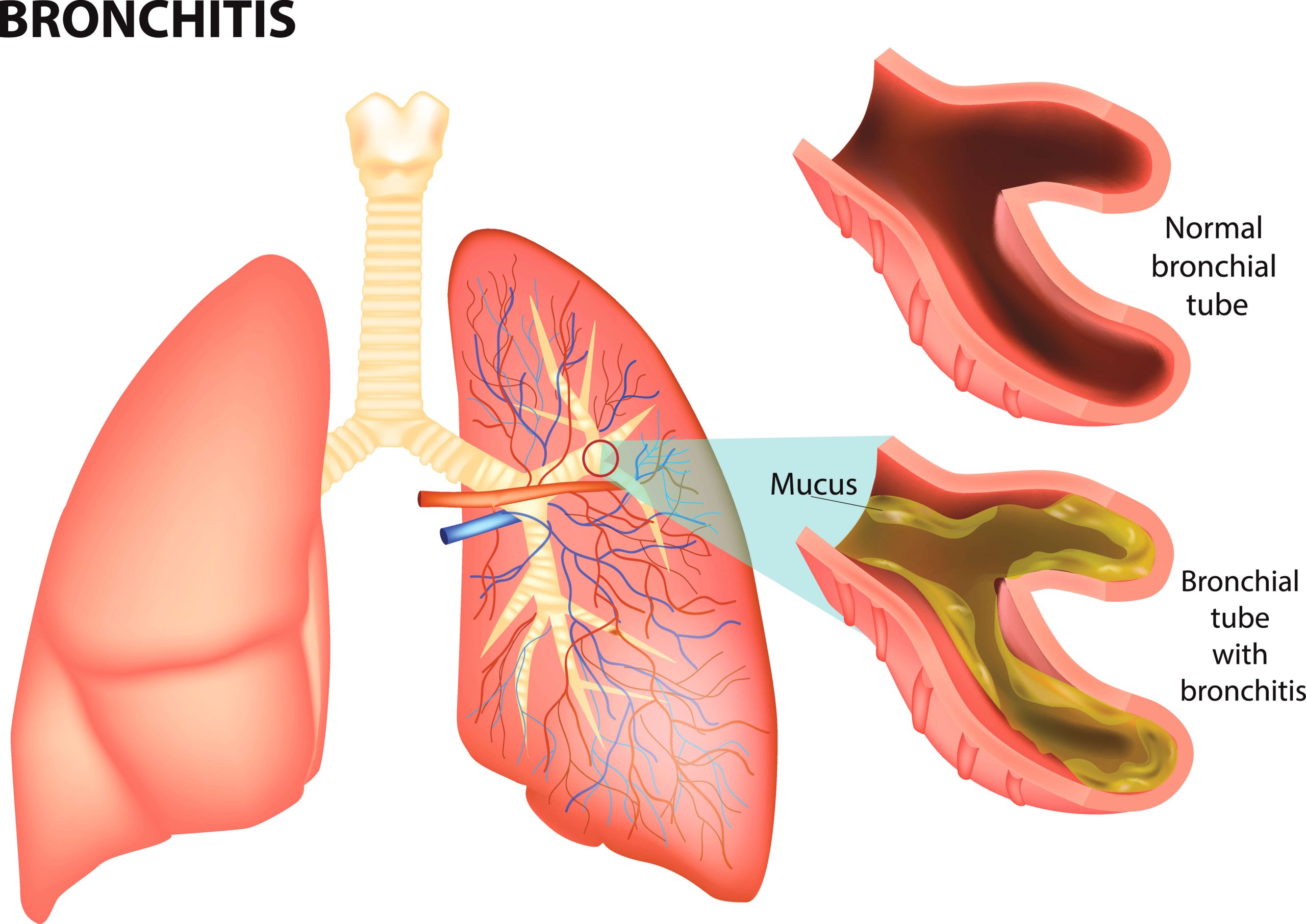BRONCHITIS
BRONCHITIS: CAUSES, TELL-TALE SIGNS, AND TREATMENTS

WHAT IS BRONCHITIS?
Bronchitis is inflammation in the airways, usually caused by an infection. Most people know it as a ‘chest cold’, but surprisingly to many, bronchitis is almost always a knock-on effect of either the common cold or the flu. When the tubes leading to your lungs fill with mucus, irritation causes swelling, and infection takes hold, a chesty cough tends to follow.
BRONCHITIS TREATMENTS
The best treatment options will be tailored to the cause of bronchitis, your most nagging symptoms, and any related conditions that may be impacted, from COPD to asthma. That said, alongside a combination of fluids, rest, and over-the-counter cough medicine, most people will benefit from non-steroidal anti-inflammatory drugs (NSAIDs), such as ibuprofen and aspirin, to keep swelling at a minimum.
While viral bronchitis cases tend to get better on their own – usually taking between 1 and 3 weeks – it’s always best to book an appointment with your doctor, pin-pointing bacterial cases early, relieving your symptoms in the meantime, and keeping complication rates down.
CAUSES OF BRONCHITIS
DO I HAVE BRONCHITIS: QUIZ
For most people in the early stages of their bronchitis journey, a hacking cough is the most obvious symptom. But to rule out allergies, COVID-19, and COPD, it’s important to know the tell-tale signs of bronchitis. If you’re experiencing a cough – with or without mucus – paired with fatigue, body aches, shortness of breath, a headache, a sore throat, and an achy chest, there’s a good chance it may be bronchitis. For concrete clarification, we’d recommend booking in with a doctor to confirm your diagnosis.
BRONCHITIS VS COVID
They’re two of the most common respiratory conditions, and so, when a sudden cough appears, it’s no surprise that many of us switch detective mode on. Thankfully, telling them apart is generally straightforward. While those with COVID-19 tend to experience a dry cough, bronchitis sufferers have a wheezing cough that produces mucus. On top, a loss of taste, difficulty smelling, and diarrhea are generally only experienced by those with COVID-19 – not bronchitis.
CAN ALLERGIES CAUSE BRONCHITIS?
Absolutely! In fact, it’s such a notable factor that it has its own name – allergic bronchitis. It occurs when an allergen, such as pollen, mold, or dust, causes inflammation in the bronchial tubes; the tubes that take the air from your windpipe into your lungs.
CAN BRONCHITIS TURN INTO A SINUS INFECTION?
Yes, but it’s far more common the other way around, where sinus infections turn into bronchitis. Both diagnoses share the same bacteria, and so, if it spreads, it’s not uncommon for it to get comfortable and grow elsewhere.
RUNNING WITH BRONCHITIS
Can you exercise with bronchitis? As a rule of thumb, we’d recommend steering clear of exercise while you’re on the road to recovery to give your body time to heal. Once you’re out of the woods – generally after 10 days – it’s advisable to take things slow, starting with low-impact exercises, and building it back up over time.
That said, everybody is different, and what works for you, may not work for somebody else with bronchitis. The best course of action would be to seek further guidance from your doctor, accounting for the severity of your infection, your fitness levels, and other medical conditions that may benefit from you working out.
TREATMENT FOR BRONCHITIS WHEN PREGNANT
Before taking any medication – over-the-counter or herbal – it’s crucial to ensure it’s safe for both you and your little one. Your doctor will be able to look at the ingredients, identify the safest option, and often, prescribe you something even more effective. In the meantime, getting plenty of rest, consuming lots of fluids, and soothing your throat with soups will provide short-term relief from your symptoms.

URGENT CARE FOR BRONCHITIS
When it comes to breathing difficulties, there should be no waiting. Urgent care centers are equipped to handle all sorts of respiratory issues, including bronchitis. Not only will they be able to confirm that you do have bronchitis, and not something higher risk like pneumonia, but they’ll also be able to get you started on a treatment plan.
Breathing difficulties can be worrying – especially when you don’t know the cause, your symptoms appear suddenly, and you don’t know who to turn to. At Ambient Virtual Care, we’re things simple. You’ll tell us when you’d like an appointment, we’ll connect you to a doctor when it’s time, and high-quality healthcare will follow, offered through an ultra-convenient app. It’s as easy as 1, 2, 3.
